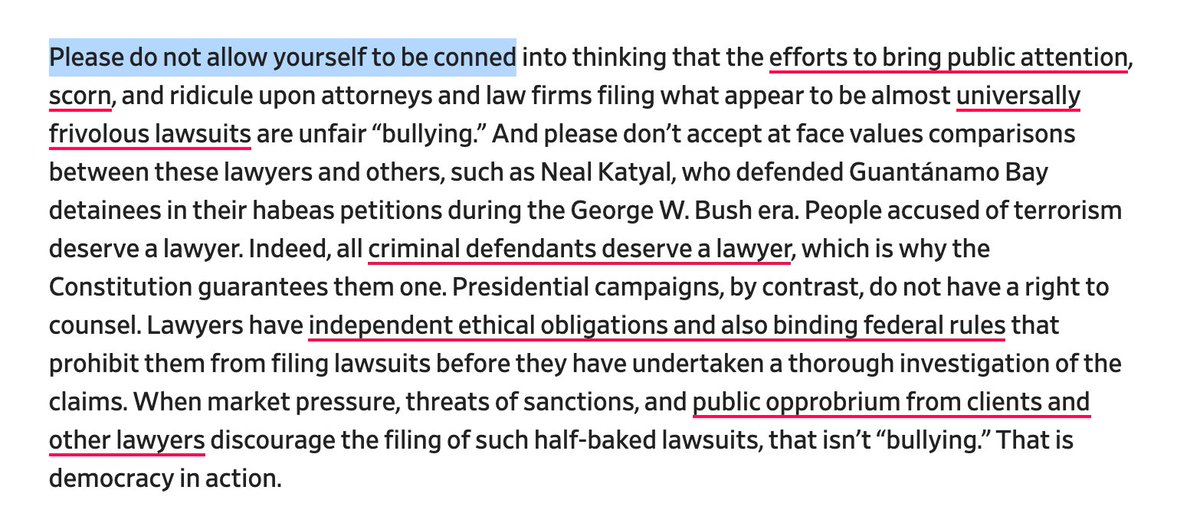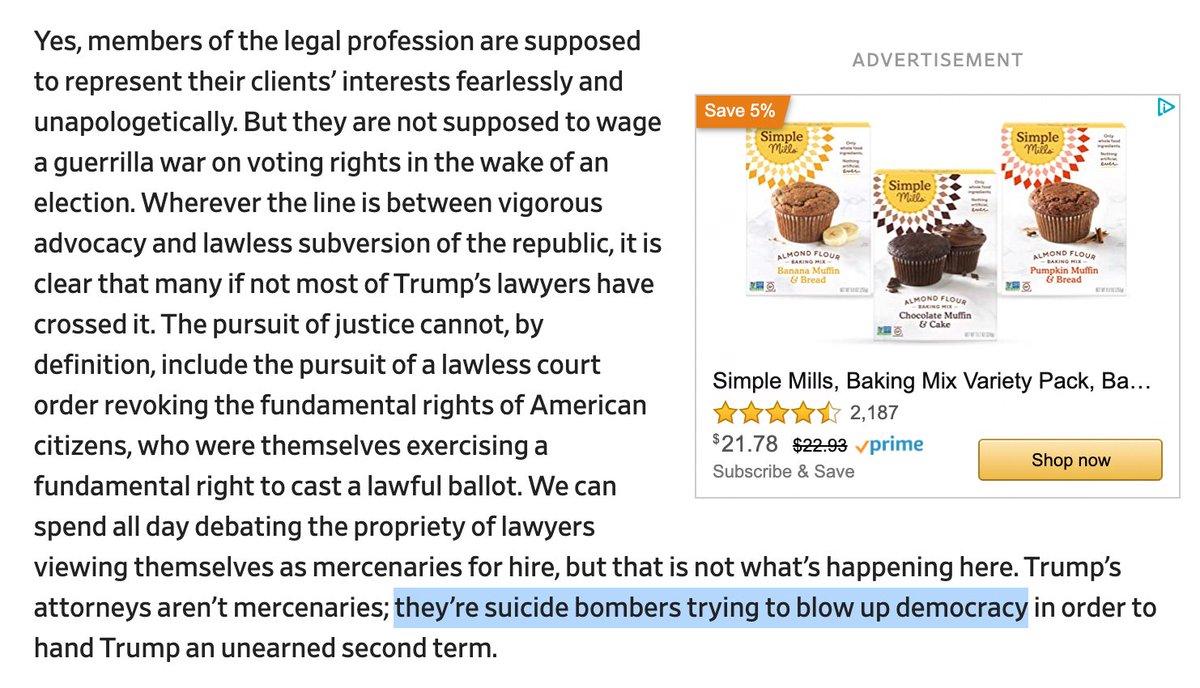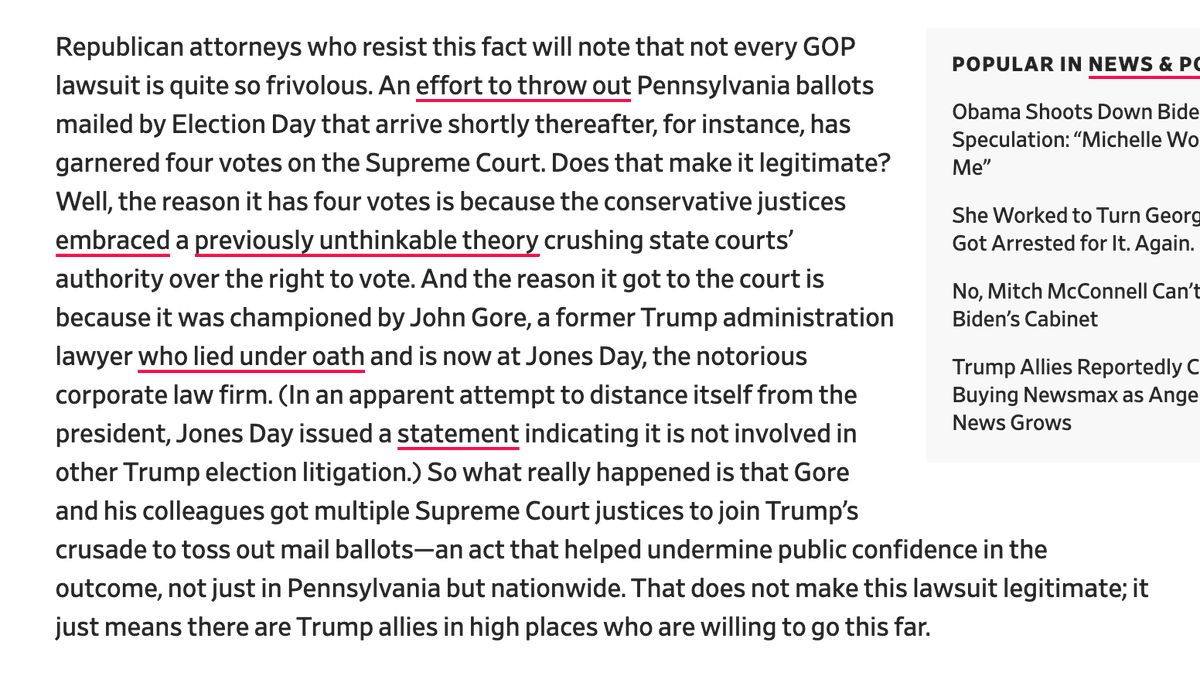
Here's my thread live-tweeting the Van Buren argument on the meaning of the CFAA.
Although C-SPAN is saying it starts at 11 eastern (now), that's wrong: It's not starting for at least 20 minutes, b/c the prior case was scheduled for 80 minutes, not 60 minutes. So stay tuned.
Although C-SPAN is saying it starts at 11 eastern (now), that's wrong: It's not starting for at least 20 minutes, b/c the prior case was scheduled for 80 minutes, not 60 minutes. So stay tuned.
When Van Buren starts, probably in about 25 minutes, it will be available live here. c-span.org/video/?477429-…
Starting, with Jeff Fisher for Van Buren opening.
Fisher's opening starts with the consequences of DOJ's view: Any TOS violations would be a crime, and that makes most people criminal. And DOJ has no good textual argument that is required.
Chief wonders about the dicta about what the CFAA meant in Musacchio, a jury instruction case, the only SCT precedent. Did Musacchio answer this? Fisher says no, that was just summarizing the statute, not taking a view on it.
Justice Thomas wants real examples of abuses. Have people really been prosecuted for TOS violations? Fisher mentions the Drew case in LA, and the NJ ticketmaster case.
CT: I don't understand why you draw a distinction between not having technical access and prohibited use. Fisher: This is about what the statute does, not whether Congress should have done this.
Breyer wants to know about the legislative history, and the different versions of the language that Congress has used over time. Does that shed light on the meaning today?
Alito focuses on the privacy implications of saying the CFAA does not criminalize use after permitting access. (Cf. EPIC brief)
Alito doesn't seem persuaded by "parade of horribles." How is lying on a dating website a crime? Fisher tries to take Alito through the statute, why, under the DOJ view, that would be a crime. (This was the Lori Drew case, btw.)
Interesting how Justice Thomas and Justice Alito are both asking about the policy question of whether the statute would cover enough. (I mean, who cares? That's for Congress.)
Sotomayor is asking a softball question, she seems clearly on Fisher's side. Fisher is citing extraneous amicus briefs, too.
Kagan asks about the word "so." What does that mean in the statute? Fisher reiterates his argument from his brief.
Kagan, like others, have questions about how broad the statute really is -- she's also unsure about the "parade of horribles." How is checking sports scores obtaining information? (It's b/c any seeing info at all is obtaining info under the stautute.)
Gorsuch asks what seems to be a friendly question about making constitutional arguments, and other criminal laws that cover hypos.
Kavanaugh: Are there other federal statutes that would cover some of the bad scenarios? (This is also sounds like a friendly Q, although I'm less sure on that.)
BK: The '84 statute seems to cover this. Why would the '86 statute be drafted more narrowly? Fisher says it's b/c the rest of the statute was so broadened in '86, which Kav seems to find plausible.
Barrett: How does exceeds authorized access fit with access w/o auth? What if Van Buren told he couldn't use the computer at all? You're reading authorization as an on/off switch, govt sees the statute as including scope of authorization.
Barrett is pressing idea that authorization is inherently scope-based; isn't it an agency idea? Fisher responds that the text doesn't suggest that. Fisher now wrapping up.
Eric Feigin is up for DOJ. He says the text answers this. Insiders are covered just like outsiders.
DOJ: Fisher is offering a "wild caricature" of DOJ's positon, and "imaginary avalanche" of prosecutions. (Lol)
Feigin is pressing trhe idea, which DOJ has never adopted in cases, that the CFAA only applies to "authorization-based" systems. It only applies to computers were users are "specifically trusted." (There is no textual basis for any of this, and DOJ hasn't taken this view b4.)
DOJ's strategy seems to be to mock the position it has defended for years as ludicrous, and to just announce some new limits in the statute that aren't in the statute. Fascinating.
Breyer: TOS are everywhere, lots of small print. That governs under your view, right? Feigen: No, authorization in the CFAA is about "specific, individualized permission." (??? Huh??? The statute doesn't say that.)
Breyer says, okay, what if the TOS names the person. Is that individualized? DOJ: That could be authorization, but that still might mot violate the statute b/c there's an implicit use requirement in the statute.
Alito: This is a difficult case on the briefs we have received. What exactly are the limiting principles you are suggesting? He wants more clarity on DOJ's view.
Alito: "I don't understand the potential scope of the statute" w/o knowing what all the terms in the statute mean. Should we have briefing on the rest of the statute? (I have some law review articles and a casebook on this, FWIW.)
Feigin: The lack of successful prosecutions for TOS shows that everyone understands that the statute doesn't cover TOS violations. DOJ lost the Drew case. Sotomayor: But your limits aren't in the statute.
I'd be curious about how others think Feigin is coming across.
Kagan: Your case is about the word "so." Why should we pick your choice of the reference for that as compared to the defense's, if the statute is unclear?
Gorsuch: This case seems to be the latest in a long line of cases in which DOJ is trying to expand criminal law. Why are we back here again? It's a rather small state crime. Why is this a federal case?
Gorsuch: This is a pattern. OSG shouldn't be rubber-stamping US Attorney's office interpretations of statutes that are very broad. Feigin: We think this is what the statute is about.
Certainly the implication of Gorsuch's view is that he's inclined to vote for Van Buren. Kavanaugh is now up, back to the text.
BK: As Justice Gorsuch says, this would be a substantial expansion of criminal liability, here just based on the word "so."
Barrett: You're relying on the word "so," does that mean you don't think the word authorization has an inherent scope limit? Feigin: Authorization means specific, individualized permission. Not just anything anyone can do.
Barrett: That's a pretty specific test to get from the word "authorization." Feigin: The problem in this case is that there's not a lot of cases on what the other limits on the CFAA means. We're not defending any other cases here. Other courts can develop the limits over time.
Fisher rebuttal: Back to the word "so," and "authorization." on consequences, DOJ is basically saying, we haven't brought a lot of these cases-- yet. But you can't just trust the govt to not bring those cases or courts to create other limits not in statute.
That's a wrap. I'm going to start a new thread on overall impressions from the argument.
• • •
Missing some Tweet in this thread? You can try to
force a refresh











